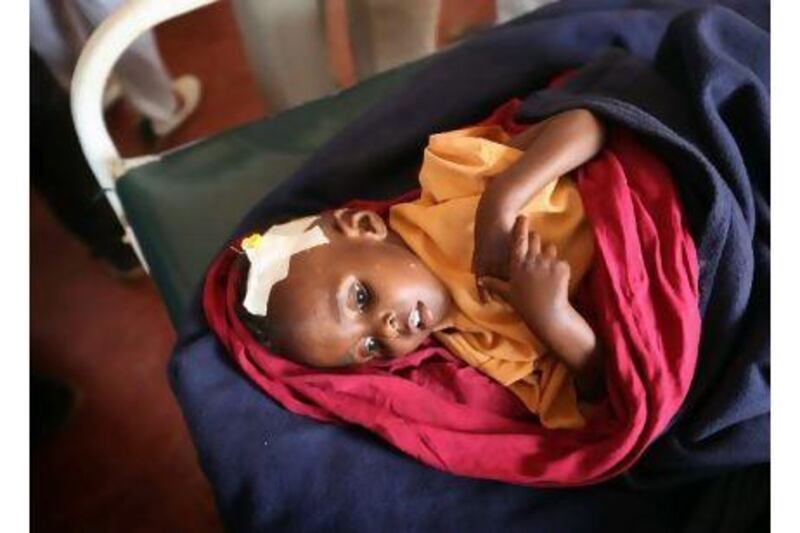NAIROBI // Parts of southern Somalia are suffering from famine, a UN official said yesterday, and tens of thousands of Somalis have probably already died in the worst hunger emergency in a generation.
The Horn of Africa is suffering a devastating drought compounded by war, neglect and spiralling prices. Some areas in the region have not had such a low rainfall in 60 years, the aid group Oxfam said.
The UN needs US$300 million (Dh1.1bn) in the next two months, said Mark Bowden, the UN's top official in charge of humanitarian aid in Somalia. The last time conditions were this bad was in 1992, when hundreds of thousands of Somalis starved to death. That famine prompted intervention by an international peacekeeping force, but it eventually pulled out after two US Black Hawk helicopters were shot down in 1993.
The southern Somali regions of Bakool and Lower Shabelle are suffering from famine, Mr Bowden said. Across East Africa, more than 11.3 million people need aid, the World Food Programme said.
"Somalia is facing its worst food security crisis in the last 20 years," Mr Bowden said. "This desperate situation requires urgent action to save lives."
Famine is officially defined as when two adults or four children per 10,000 people die of hunger each day and a third of children are acutely malnourished. In some areas of Somalia, six people are dying a day and more than half of children are acutely malnourished, Mr Bowden said. Prices of staple foods have increased 270 per cent over the past year.
"If we don't act now, famine will spread to all eight regions of southern Somalia within two months, due to poor harvests and infectious diseases," Mr Bowden said.
He said it was unlikely there would be any respite from the drought until the end of the year and that he believed tens of thousands had already died in regions the UN was unable to access.
Somalia is the most dangerous country in the world to work in, according to the UN's World Food Programme, which lost 14 relief workers in the past few years. Looting and attacks on aid convoys occur frequently.
Some factions of Al Shabab had already agreed to let aid workers back in, said the UN's top humanitarian coordinator, Valerie Amos.
"What has been stopping us and our partners from operating in the south and the centre have been the insecurity and the restrictions imposed by Al Shabab," she said.
Her colleague Amir Mahmoud Abdulla, the deputy executive director of the World Food Programme, said: "Once you start feeding in certain areas you will get a rift within Al Shabab. It is already starting to happen."
Djibouti, Ethiopia and Kenya have also been badly affected, and Eritrea is also believed to be hard hit, though its repressive government does not release figures. Oxfam says the drought has been exacerbated by poor governance, war in Somalia and land policies that restrict grazing land for nomadic communities.





